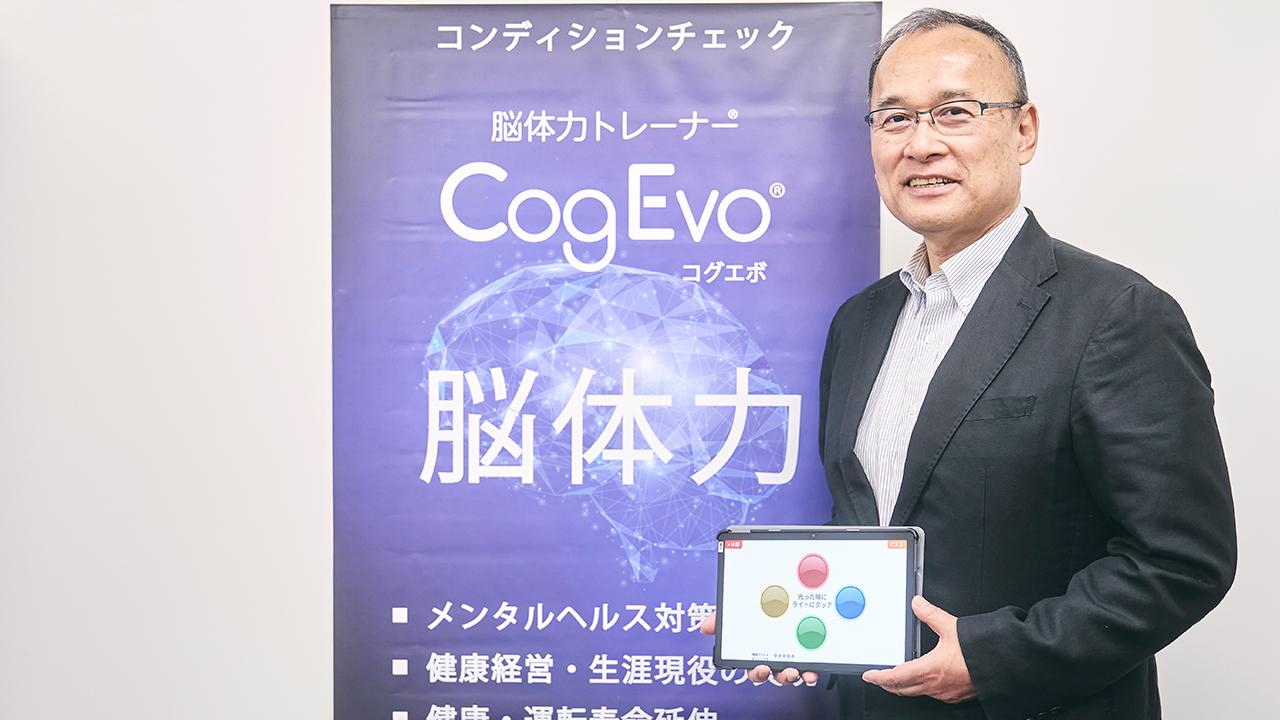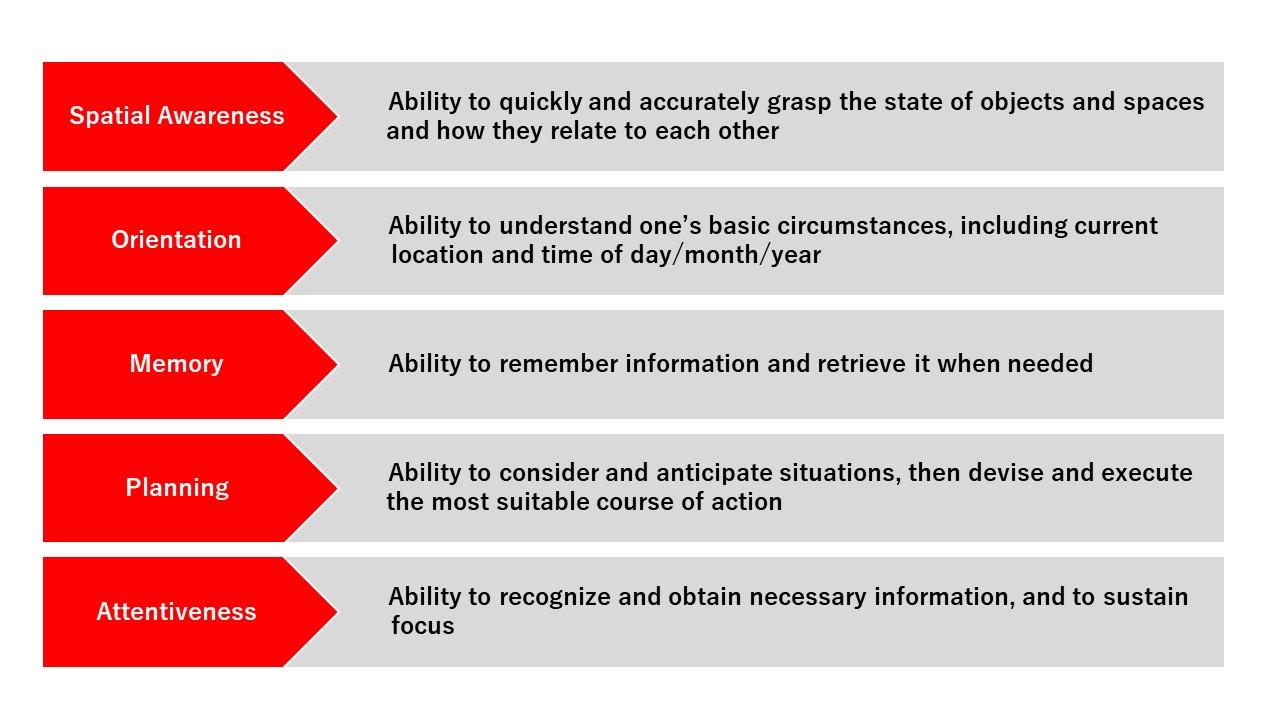
"Partners in Future Mobility" profiles innovative startups that participated in the Japan Mobility Show 2023. This time, we caught up with Total Brain Care, creators of cognitive function testing and training tool Powerful Brain Trainer CogEvo.

Held for the first time last fall, the Japan Mobility Show renamed and redefined the Tokyo Motor Show as a platform where various mobility-related companies from the auto industry—and beyond—come together to create the country’s future.
This series profiles innovative startups that participated in the Japan Mobility Show 2023. What does mobility mean to those like-minded partners also working to create the future, and what visions lie behind their endeavors? We delve into the stories that emerge from the Japan Mobility Show and the possibilities they offer for the future of mobility.
Detecting risk through powerful brain visualization
Total Brain Care is the Kobe-based venture company behind Powerful Brain Trainer CogEvo, a tool for testing and honing cognitive function. Users gain a visual representation of five cognitive functions directly connected to everyday life by simply solving their way through 12 different five-minute games.

Since the words “cognitive function” tend to have negative connotations linked to dementia, Total Brain Care has trademarked the term “powerful brain” and promotes its services as a “powerful brain trainer.”
“We use five main cognitive functions in our work and daily lives. Yet very few people’s results show a neat pentagon. Everyone has weak areas, for which they compensate with their strengths,” says Total Brain Care CEO Shinsuke Kawagoe.
“As we age, however, our abilities shrink across the board. A single weakness turns into two, and you may increasingly forget things like taking medications. Dementia refers to symptoms or conditions where cognitive function declines to the point of interfering with one’s daily activities or social life. It is a general name for diseases that impair cognitive function. While Alzheimer's is the most common, there are said to be dozens of other dementia-causing disorders (70 kinds are generally agreed upon), such as dementia with Lewy bodies.
CogEvo scores users on the percentage of correct answers and the time required, which allows us to diagnose their state of recovery. What’s more, even when a patient with higher brain dysfunction is discharged from hospital, we can identify which functions are weak and advise them on what to look out for.
To give a specific example, someone with weak spatial awareness and attentiveness is at risk of falling over, so we would recommend using a cane and switching from glass to plastic cups in case they are dropped. By visualizing cognitive ability, we can identify problems before they happen.”
And CogEvo does more than just provide a visual rendering of cognitive functions; through repeated use, the tool also helps to maintain and improve them. Medical facilities use CogEvo as a training device for individuals with developmental disabilities and patients with higher brain dysfunction, which often results from traffic accidents or brain contusions.
Cognitive functions at full throttle
CogEvo was exhibited at the Japan Mobility Show 2023, where the company also took part in the pitch contest.

“People drive with all their cognitive functions at full throttle. Without attentiveness and spatial awareness, you could not keep a suitable distance from other cars. Reaching your destination requires planning and orientation. Even the impulse to get in the car and drive stems from cognitive functions—for instance, the desire to visit and play with grandchildren. In other words, driving and cognitive function are inextricably linked. We exhibited at the event because we want people to understand that cognitive function is important, even if you’re just driving for fun.”
Through collaborative research with Aomori University, Total Brain Care published a paper in 2016 on the link between cognitive function and driving. At the time, Aomori had a problem with elderly drivers who relied on their licenses just to go shopping, and the issue only got worse during the snow season. To stay behind the wheel well into old age, individuals must understand the state of their own cognitive function and take steps to drive safely.
“The Mobility Show was attended by numerous representatives from manufacturers, industrial firms, engineering departments, and research institutes. Most of them approach cognitive function from the perspective of hardware such as cars. By contrast, we propose people-centered solutions, and that novelty helped us attract a lot of interest at the event.”
The Mobility Show led to CogEvo being adopted for health checkups in the Iwaki area of Hirosaki City (Aomori) as part of a joint research project between Mazda and Hirosaki University aiming to “clarify the relationship between individual differences in car driving ability and attitudes toward health and driving.” New projects are also underway with two other companies. As it happens, Toyota Motor Health Insurance Society’s Welpo health support centers have been using CogEvo for checkups since 2020, facilitating preventative action and guidance focused on cognitive function.
“We’ve had a positive response from within the company, our clients, and stakeholders, including new projects finalized within a year of the show. And since venture companies tend to hit it off with each other, our network has also expanded among fellow exhibitors.”
But why are automakers interested in cognitive function visualization? Though Kawagoe says he does not have a definitive answer, he suggested the following:
“Various systems are being created to make driving safer, including autonomous driving. However, they aren’t needed by everyone. Using CogEvo to understand a driver’s cognitive traits helps carmakers recommend which functions should be installed. Consumers can also be confident that they are adding the right optional features. I think we’ll see it used in this way.”
Working to solve society’s problems
Kawagoe explains that his road to developing Powerful Brain Trainer CogEvo was long and winding. After graduating from university, he worked for Uchida Yoko selling large-scale computers. This was the pre-internet era, which Kawagoe says allowed him to learn the fundamentals, including how computers worked, what sort of commands produced certain results, and how data could be sent between machines. All this would prove useful in developing the current system.
Later, when Kawagoe’s father became ill, he took up the family lumber business. Moving with the times, he pivoted to construction and began working on “healthy housing” to address the impact of buildings on their occupants’ well-being. Kawagoe was driven by a desire to “do work that solved society’s problems.” At the same time, he frequented conferences to connect with doctors and researchers, launching a group to study safe living environments and, in the process, learning how to forge partnerships between industry, government, and academia. Unfortunately, in 2008 the financial crisis forced him to close the construction firm.
“Around this time, a medical professor friend of my wife’s developed a cognitive function supplement and asked me for help with promotion. My nature is to seek out authenticity, so I set out to gain endorsement for the supplement by arranging for him to present his findings at medical research conferences.”
Along the way, Kawagoe developed an interest in dementia and established contact with doctors through related conferences. When one suggested they would be keen to collaborate on something to enable early detection of cognitive decline, Kawagoe began searching for solutions. These efforts led him to a training tool for helping those with higher brain dysfunction reintegrate into society, which would eventually become CogEvo.

“Scales help people stick to their diets because they can see how they’re doing by simply stepping on it. By contrast, the idea of testing cognitive function scares many. With CogEvo, it can be turned into a fun daily activity, and visualizing cognitive function can help solve social issues. I felt that I was on to something.”
From there, Kawagoe conducted research to show that his results correlated with MMSE, a globally recognized dementia screening test, and worked to develop the necessary cloud software. To date, CogEvo has been the subject of more than 25 papers and conference presentations, proving itself as a highly trusted tool. Recent years have seen a rise in inquiries from outside Japan, with the company currently working on a French version to follow up the English release.
“Recently, we’ve been promoting CogEvo’s potential in tackling mental health, a key subject in health management.
Since early detection is crucial in dealing with mental health issues, there is a growing need for ways to quickly assess an individual’s status. Cognitive function can be used to grasp the mental and physical condition of employees and swiftly adopt any necessary steps.”
This is already being trialed on 4,000 employees at Nippon Travel Agency. Kawagoe says the ultimate goal of CogEvo is “positive health” (individuals actively managing their own health, even in the case of illness or disability). Lastly, we asked him the question we pose to everyone in this series: what is mobility?
“Movement as a means, which includes the underlying motive and the powerful brain that stimulates it. Mobility is more than merely transportation—it is connected to the individual’s way of life.”

